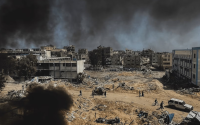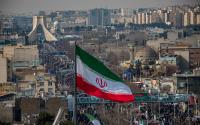13 June 2005Knight RidderTom Lasseter
Shiites, Sunnis must find solution to insurgency, US commanders warn.Baghdad - A growing number of senior American military officers in Iraq have concluded that there is no long-term military solution to an insurgency that has killed thousands of Iraqis and more than 1,700 U.S. military personnel during the past two years.
Instead, officers say, the only way to end the guerrilla war is through Iraqi politics -- an arena that so far has been crippled by divisions between Shiite Muslims, whose coalition dominated the January elections, and Sunni Muslims, who are a minority in Iraq but form the base of support for the insurgency.
"I think the more accurate way to approach this right now is to concede that... this insurgency is not going to be settled, the terrorists and the terrorism in Iraq is not going to be settled, through military options or military operations," Brig. Gen. Donald Alston, the chief U.S. military spokesman in Iraq, said last week, in a comment that echoes what other senior officers say. "It's going to be settled in the political process."
Gen. George W. Casey, the top U.S. commander in Iraq, expressed similar sentiments, calling the military's efforts "the Pillsbury Doughboy idea" -- pressing the insurgency in one area only causes it to rise elsewhere.
"Like in Baghdad," Casey said during an interview with two newspaper reporters, including one from Knight Ridder, last week. "We push in Baghdad -- they're down to about less than a car bomb a day in Baghdad over the last week -- but in north-center (Iraq)... they've gone up," he said. "The political process will be the decisive element."
The recognition that a military solution is not in the offing has led U.S. and Iraqi officials to signal they are willing to negotiate with insurgent groups, or their intermediaries.
"It has evolved in the course of normal business," said a senior U.S. diplomatic official in Baghdad, who spoke on the condition of anonymity because of U.S. policy to defer to the Iraqi government on Iraqi political matters. "We have now encountered people who at least claim to have some form of a relationship with the insurgency."
The message is markedly different from previous statements by U.S. officials who spoke of quashing the insurgency by rounding up or killing "dead enders" loyal to former dictator Saddam Hussein. As recently as two weeks ago, in a Memorial Day interview on CNN's Larry King Live, Vice President Dick Cheney said he believed the insurgency was in its "last throes."
But the violence has continued unabated, even though 44 of the 55 Iraqis portrayed in the military's famous "deck of cards" have been killed or captured, including Hussein.
`We can't kill them all'
Lt. Col. Frederick P. Wellman, who works with the task force overseeing the training of Iraqi security troops, said the insurgency doesn't seem to be running out of new recruits, a dynamic fueled by tribal members seeking revenge for relatives killed in fighting.
"We can't kill them all," Wellman said. "When I kill one I create three."
American officials had hoped that January's national elections would blunt the insurgency by giving the population hope for their political future. But so far, the political process has not in any meaningful way included Iraq's Sunni Arab population.
Most of Iraq's Sunni Arabs, motivated either by fear or boycott, did not vote, and they hold a scant 17 seats in the 275-member parliament.
With Shiites and Kurds stocking the nation's security forces with members of their militias, Sunni Arabs have been marginalized and, according to some analysts in Iraq, have become more willing to join armed groups.
U.S. officials prefer not to talk about the situation along religious lines, but they acknowledge that one of the key obstacles to resolving Iraq's problems is the difference between Sunni and Shiite religious institutions.
Shiites are organized around their marja'iya, a council of clerics -- led in Iraq by Grand Ayatollah Ali al Sistani -- that issues religious edicts that Shiite faithful follow as law. Sunnis, on the other hand, have no such unifying structure.
Unless Sunnis develop confidence that the government will represent them, few here see the insurgency fading.
Asked about the success in suppressing the insurgency in Baghdad recently -- the result of a series of large-scale raids that targeted primarily Sunni neighborhoods -- Alston said that he expects the violence to return.
"We have taken down factories, major cells, we have made good progress in (stopping) the production of (car bombs) in Baghdad," Alston said. "Now, do I think that there will be more (bombs) in Baghdad? Yes, I do."






